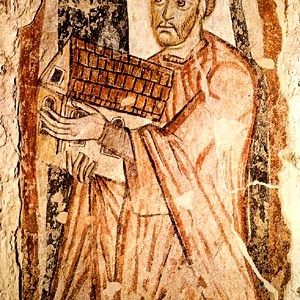In the Psalms, prayer is often portrayed a cry to a God who seems distant.
For example, in Psalm 130, the petitioner says:
Out of the depths I call to you, LORD;
Lord, hear my cry!
May your ears be attentive
to my cry for mercy. …
I wait for the LORD (1-2, 5).
There is a sense in these lines that God is not
near, but far. The psalmist cries out so that He might be heard; he is waiting
for the God who is unseen to appear. And yet, there are also psalms like this
one, which assert that the Lord is in the abyss with us:
Where can I go from your spirit?
From your presence, where can I flee?
If I ascend to the heavens, you are there;
if I lie down in Sheol, there you are (Psalm 139:7-8).
Because of God’s omnipresence, we are always in His presence. But prayer adds something to this reality. Prayer brings about a kind of real union with God: He is more than present to us, in the same way that the atmosphere is present to us. In prayer, His presence becomes part of who we are. A real union occurs—much like the air that fills our lungs, and the oxygen that that air sends coursing throughout our veins.
This deeper presence—this union—is hinted at earlier
in Psalm 139:
LORD, you have probed me, you know me. …
Even before a word is on my tongue,
LORD, you know it all (vv. 1-4).
That prayer unites is with God is widely affirmed in Church teaching. Just take a look at the Catechism of the Catholic Church’s introduction to prayer, the Catholic Encyclopedia’s synopsis of St. Teresa of Avila’s teaching on contemplative prayer, or popular spiritual writer Father Jacques Philippe’s newest book on prayer.
In other areas it is evident why union with God is
possible. Most obvious is the Eucharist, in which we receive the body and soul
and divinity of Jesus.
But what about prayer? Isn’t that us reaching for
God, rather than God coming to us?
To the contrary, prayer is very much a work of God
in us.
In Philippians 2:12-13, St. Paul lays down the
principle that everything pertaining to our salvation is ultimately the work of
God:
So then, my beloved, obedient as you have always been, not only when I am present but all the more now when I am absent, work out your salvation with fear and trembling. For God is the one who, for his good purpose, works in you both to desire and to work.
In the case of prayer, St. Paul teaches that it is a
Trinitarian act. In other words, prayer brings us into contact with each member
of the Trinity—Father, Son, and Spirit. This isn’t just because we make the
Sign of the Cross every time we pray, invoking all three persons of the
Trinity. In Romans 8, St. Paul suggests that every act of prayer is by its very
nature the work of the Trinity.
This understanding of prayer starts with the truth
that the Spirit dwells within us:
If the Spirit of the one who raised Jesus from the dead dwells in you, the one who raised Christ from the dead will give life to your mortal bodies also, through his Spirit that dwells in you (v. 11).
Later in the chapter, Paul explains that the Spirit
intercedes for us. But the Spirit also helps us intercede for ourselves:
In the same way, the Spirit too comes to the aid of our weakness; for we do not know how to pray as we ought, but the Spirit itself intercedes with inexpressible groanings (v. 26).
Earlier in the chapter, Paul is even clearer that
the Holy Spirit is the one who moves us to speak to God:
For you did not receive a spirit of slavery to fall back into fear, but you received a spirit of adoption, through which we cry, “Abba, Father!” (v. 15).
This verses gives us more insight into how the
Spirit enables us to pray: it makes us the adopted children of the Father, by
uniting us with His son. This is evident by the words the Spirit gives to
us—‘Abba, Father’—which are the words Christ Himself cried out to the Father in
the Garden of Gethsemane.
The Trinitarian dimensions of prayer should now be
clear. It is God the Spirit who moves deep within us, uniting us so closely to
God the Son that His prayer to the God the Father becomes ours. Or, as the catechism
puts it,
Christian prayer is a covenant relationship between God and man in Christ. It is the action of God and of man, springing forth from both the Holy Spirit and ourselves, wholly directed to the Father, in union with the human will of the Son of God made man.
Put simply: prayer is the activity of the Holy
Spirit, uniting us with Christ and pointing us to the Father. Prayer is an
encounter with all three persons of the Trinity. It is not only something we
say to God; it is also something we do in and through
Him.
This reality should be greatly encouraging to us. It
means that prayer itself always produces some kind of real union with God
because the very act of prayer presumes such a reality. So we can pray to be
closer to God. More to the point, we can pray to be united to Him—and, in those
prayers, we can have confidence that in the mere asking such a prayer has
already, to some extent, been answered.
Of course there are degrees of union with God. But
the point is that great saints like St. Francis of Assisi and St. Teresa of
Avila aren’t the only ones who experience union with God. All one needs to
experience some union with God is to simply pray. It may not be the ecstasy of
St. Teresa but it is nonetheless a real union.
Prayers are thus not messages in a bottle set adrift
in time and space until God in heaven hears them. They are a participation in
the very life of the Trinity. It may not seem like we are in the midst of the
Trinity, but we can be confident that God hears us just as much as the Father
heard Jesus crying out on the cross—even though it took a death and descent to
hell before that answer became manifest in the Resurrection.
The Trinity is ‘bigger’ and infinitely more vast than any possible human experience, even including our sense of abandonment from God. It is prayer that brings us into contact with this glorious reality.
✠
Photo by Daniil Silantev on Unsplash












